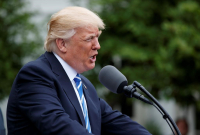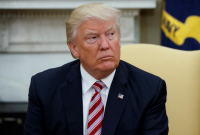Support strong Canadian climate journalism for 2025
Washington is bracing for a high-impact political spectacle. The question on everyone's mind: Whether this incoming political asteroid lands wide of the White House, or slams into it and causes an extinction-level threat to Donald Trump's presidency.
The former FBI director has just announced he will testify about his relationship with a sitting president, a president who fired him, a president whose entourage he was investigating.
Everyone wants to hear what James Comey has to say — including the president's party. Sen. Marco Rubio said the testimony, anticipated early next month, could shed some light on whether the White House attempted to obstruct justice in the Russia investigation.
"There's no doubt this cloud is impacting everything else and we need to get over this once and for all," Rubio told CNN over the weekend. "In two weeks we'll know a lot more, based on the testimony that he gives, under oath, before the committee and the country."
He added: "If any president tries to impede an investigation — any president, no matter who it is, by interfering with the FBI — yes that would be problematic. Not just problematic — obviously it would be a potential obstruction of justice."
Rubio laid out some of the questions he'll have when Comey testifies soon before the Senate intelligence committee, which he announced he would do following a deluge of news last Friday.
The announcement came after reports Comey kept memos about his interactions with Trump; that Trump made him feel uncomfortable; that Trump urged him to lay off the Russia investigation; that the investigation was reaching into the highest levels of the current White House; and that Trump told a Russian delegation after firing Comey that the pressure was off him now.
Rubio told CBS some of his questions will include: "'What did the president say? Did, in fact, you keep memos? What do those memos say and why did you write them and what was your feeling?' The American public deserves to know the answers to that."
So far, the pot-shots at Trump's presidency have come from the shadows, with anonymous sources gabbing to the press and leaking transcripts.
For example, two Trump cabinet members who were inside the closed-door meeting with the Russians challenged the New York Times and Washington Post accounts of it. They said the president mentioned the topics described in the media reports, but that the stories exaggerated the meaning.
Now everyone will be able to watch and judge.
The mood on Capitol Hill has changed since Comey's firing, with Republicans gingerly stepping away from their previously staunch defence of the president. Some staffers say Republicans are increasingly tired of defending Trump.
There are currently four investigations into different aspects of the Russia affair, plus a special counsel. The Republican-controlled committees have become more aggressive in seeking documents for ongoing investigations — including some from the Treasury Department related to money-laundering.
Some party supporters have noticed this — and they don't like it one bit.
Witness the reaction to Rubio's interviews on the Sunday morning political talk shows. Right-wing talk star Laura Ingraham mocked the senator's quip about a cloud lingering over the White House.
"Only if Republicans in the MAJORITY allow it to — or want it to," she tweeted, with the implication of that all-caps, "majority," being that Republicans have the power to shut down congressional investigations.
Trump remains wildly popular with the party grassroots, more so than GOP lawmakers in general.
Another conservative radio host suggested a different approach to Comey's hearing: Invite him, and pound him with aggressive questions. In fact, his suggested approach would make Comey, and Democrats, the target.
Mark Levin was a senior Justice Department staffer under Ronald Reagan and he suggests asking Comey: Did your notes contain classified information? Did you share these notes illegally? Did you witness obstruction of justice and fail to report it? Did you also take, or destroy, notes of conversations with ex-president Barack Obama, his attorneys-general, members of Congress, or the media?
"To me, the scandal is what's in these notes," Levin said.
"It's a potential felony (to sit on evidence of a crime)."
The drama will linger for a few more days. A date for Comey's hearing will be set next week, and he's expected to testify the following week.





Comments